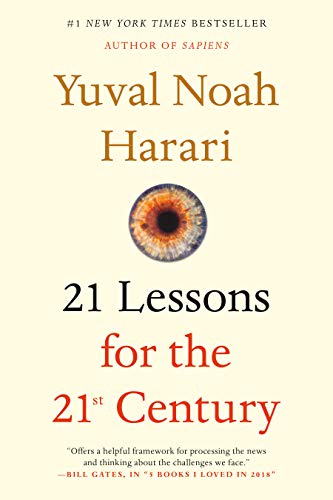Summary: Link to heading
21 Lessons for the 21st Century explores the most pressing issues of our time, touching on politics, technology, society, and the personal and collective challenges we face. Harari’s overarching message is about the need for awareness and adaptability as we navigate the future shaped by rapid technological advancements and shifting global dynamics.
Part I: The Technological Challenge Link to heading
Disillusionment Explores why many people are losing faith in traditional ideologies like liberalism, socialism, and nationalism, and the implications of this disillusionment on global stability.
Work Discusses how AI and automation are transforming jobs, leading to fears of mass unemployment and the need to redefine work and productivity.
Liberty Raises concerns about surveillance and data collection, and how AI could threaten personal freedoms if misused by governments or corporations.
Equality Looks at the potential widening of social inequality as technology advances, with those controlling data and algorithms gaining immense power.
Part II: The Political Challenge Link to heading
Community Examines the decline of local communities in the age of globalization and the need for belonging in a world that feels increasingly fragmented.
Civilization Explores the clash of civilizations and the potential conflicts between global and local identities, calling for a new understanding of shared human culture.
Nationalism Questions the relevance of nationalism in solving global problems and warns against the divisive potential of extreme nationalist ideologies.
Religion Discusses the role of religion in the modern world, both as a source of identity and a potential cause of conflict, and the challenges it faces from secularism and science.
Immigration Analyzes the tensions surrounding immigration, considering both economic and cultural arguments and suggesting that the issue requires global cooperation.
Part III: Despair and Hope Link to heading
Terrorism Puts the threat of terrorism into perspective, arguing that its psychological impact is often far greater than its actual physical threat.
War Examines the declining likelihood of full-scale wars between nations but warns of new types of conflict, such as cyber warfare.
Humility Urges nations and cultures to adopt a more humble attitude, recognizing that no one has all the answers to humanity’s biggest questions.
God Analyzes the role of religion in providing meaning, suggesting that while it can offer purpose, it may also hinder progress.
Secularism Advocates for secular ethics based on compassion and truth, calling for an approach to life that is guided by reason rather than dogma.
Part IV: Truth Link to heading
Ignorance Emphasizes the importance of education and critical thinking in combating misinformation and understanding complex issues in the modern world.
Justice Questions what justice means in a world where technology enables global wealth and poverty, asking how society can address deep-rooted inequalities.
Post-Truth Explores how social media and biased algorithms contribute to the spread of “fake news” and challenges people to critically assess information.
Science Fiction Warns that science fiction often shapes our expectations of technology in unrealistic ways, urging caution in believing in technological fantasies.
Part V: Resilience Link to heading
Education Discusses how education needs to adapt to prepare people for a rapidly changing future, emphasizing critical thinking, creativity, and emotional resilience.
Meaning Explores humanity’s ongoing search for meaning in a world where traditional belief systems are in decline, suggesting that we must create our own sense of purpose.
Meditation Recommends meditation and mindfulness as tools for understanding oneself and coping with stress in a world filled with distractions and uncertainty.
Each lesson reflects Harari’s view on how individuals and societies can address the challenges and opportunities of the 21st century. By fostering adaptability, critical thinking, and self-awareness, he suggests we can find our footing in a rapidly changing world.
Key Themes and Lessons: Link to heading
Technology and Artificial Intelligence: Harari explores how AI and machine learning will redefine industries, jobs, and even our sense of purpose. He suggests that automation could lead to significant unemployment, but also offers the potential for humans to re-imagine productivity and creativity.
The Rise of Data and Big Tech:
Companies that control data wield immense power, raising questions about privacy, manipulation, and governance. Harari emphasizes the importance of ethical guidelines and regulations in the digital age.
Nationalism vs. Globalism: In a world with global threats like climate change, pandemics, and economic inequality, Harari argues that nationalism may be counterproductive. He advocates for more global cooperation, yet acknowledges the pull and political force of nationalism.
Post-Truth and Fake News: The book highlights how misinformation and “fake news” undermine democracy. Harari warns of the risks when truth becomes subjective and suggests education and critical thinking as essential tools against this trend.
Climate Change and Ecological Collapse: Addressing climate change is presented as humanity’s most urgent task. Harari calls for international cooperation and innovation to prevent catastrophic outcomes.
Religion and Secularism: Harari delves into the roles of religion and secularism in modern society, arguing that while religions offer purpose and structure, they can also create division. He suggests that secular ethics could bridge some divides.
Meaning and Purpose: With the erosion of traditional belief systems and job roles, people are increasingly searching for meaning. Harari discusses how cultivating mindfulness and embracing uncertainty can help individuals find purpose in an unpredictable world.
Main Takeaways: Link to heading
Adaptability is Key: In an era of constant change, being adaptable and open to lifelong learning is crucial.
Embrace Global Cooperation: Many of today’s challenges require collective action, which may mean transcending nationalist or isolationist tendencies.
Stay Informed and Critical: As misinformation spreads, individuals must become critical thinkers to safeguard personal agency and democratic processes.
Mindfulness and Self-Awareness: Amid information overload and rapid change, self-awareness can help individuals maintain mental clarity and resilience.
Ethics in Tech: Ethical considerations must guide the development of AI and data usage, with attention to potential social impacts.
Harari’s work encourages readers to think critically and actively engage in shaping the future, underscoring the role of individuals in addressing global issues through understanding and action.
